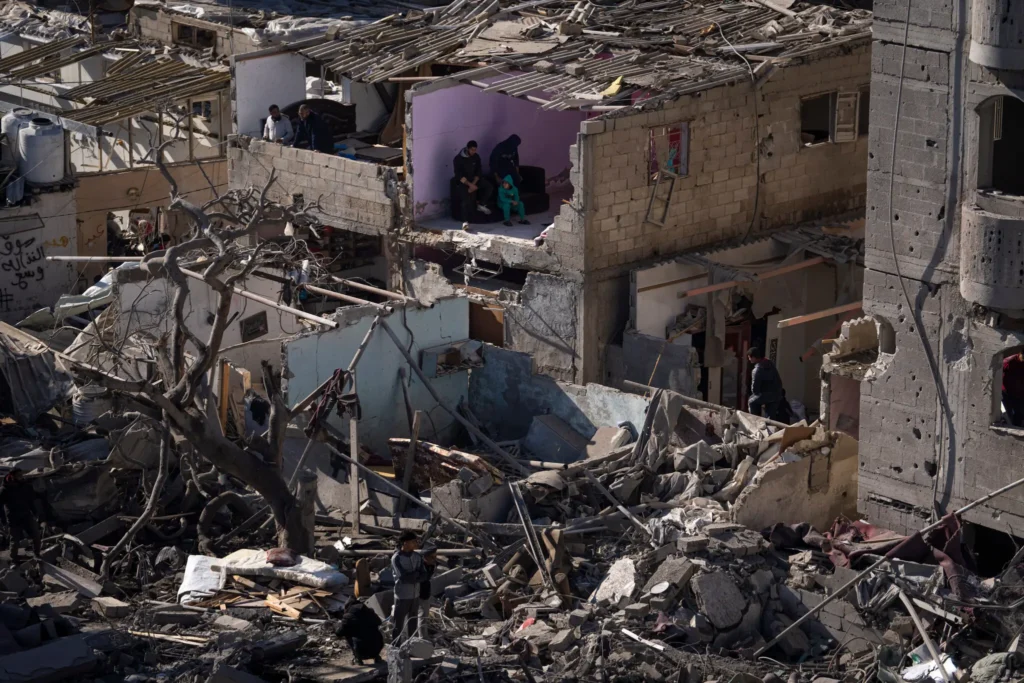
With casualties in Gaza exceeding 100,000, the obliteration of the territory and the reduction of Gazans to such a state of desperation that over 100 died trying to access a rare aid convoy, the parade of horrors has been so continuous that there has been virtually no time to consider the fundamental justification of Israel’s invasion. It is assumed to be self-defense, but it is not.

It is widely acknowledged that the Netanyahu regime and the Israeli defense establishment were grossly negligent in failing to defend Israel on October 7th, when effective defense would have required so little. Few have applied the same logic with a future view. With all the military might that the U.S. supplies – fighter jets, tanks, howitzers, bombs – Israel is only exposed to Hamas fighters with their homemade weapons if it lapses into another instance of such gross negligence.
Israel can simply guard its border with Gaza, position minimal forces nearby and remain vigilant. It does not matter that Hamas is a terrorist organization, nor that October 7th was barbaric. Hamas is an enemy with limited resources, and one penned into an enclave from which any outbreak is easily detectable.
The world should put an immediate stop to Israel’s invasion, both because it is not in self-defense and because its prosecution is “over the top,” as President Biden has ineloquently put it. The U.S. should support a U.N. resolution for an immediate unconditional permanent ceasefire.
Since it is not self-defense, what should we call an onslaught of such massive and horrific proportions?
Why did Israel invade? Because it is only human nature to retaliate. Yet, retaliation is mostly unthinking and reflexive and, mostly, in the moment. The invasion seeks revenge. Yet, unbridled revenge-seeking is neither inherently justifiable, nor necessarily smart. Neither retaliation nor vengefulness justify actions taken 150 days later.
Israel says that its security relies upon its many enemies knowing that any attack will be answered with a counterattack that is many times more powerful and devastating. In concept, the world gives this policy deference, because Israel is a small nation surrounded by many larger enemies, and because its people have suffered the Holocaust and pogroms through history.
Yet, even disproportionality to achieve deterrence should have limits. Once over those limits, it achieves the opposite. It invites another cycle of revenge-seeking and attacks and counterattacks.
Israeli Premier Netanyahu has stated that the invasion has three objectives: first to free the hostages, second to “eliminate” Hamas and third to “control” Gaza. None has been achieved. Netanyahu says “not yet,” while many observers think “never.” Netanyahu says “it’s not over until it’s over,” until after the conquest of Rafah in southern Gaza.
Invading Rafah would be logically consistent with Netanyahu’s actions so far. In fact, assaulting Rafah is the essential final step without which his prior actions would be ineffectual and non-sensical. But Netanyah’s internal logic does not change the overall illogic and illegitimacy of the invasion. Nevertheless, Netanyahu has not and will not stop, because to stop would destroy his own internal logic.
Nevertheless, Netanyahu’s internal logic would likely collapse with an invasion of Rafah, since the chances of success on his terms would be slim.
“After Rafah” would mean that remaining hostages would be left to their own devices amidst intense urban warfare. What Hamas fighter would protect hostages or prisoners, if fighting for his own survival? Netanyahu’s first objective wouldn’t be achieved, except in part and except by chance.
“After Rafah” supposes that Israel could eliminate Hamas once its fighters had nowhere to run and nowhere to hide. But Hamas members do not wear uniforms or carry IDs, so there would be no way to determine whether fighters had been killed or had melted into the civilian population. Attainment of Netanyahu’s second objective would be indeterminate.
“After Rafah,” Israel would indeed control Gaza, meaning it would occupy 2.3 million displaced persons in a wasteland – if it does not already. It is difficult to describe that as anything but defeat. So much for Netanyahu’s third objective.
It is worse than that. Israel’s 7.2 million Jews cannot possibly occupy 2.3 million destitute Gazans and 2.7 million Palestinians on the West Bank while keeping almost 1.7 million Palestinian citizens of Israel happy. It is impossible militarily, financially and psychologically. At some point, an occupying force becomes so consumed by occupation that it becomes the prisoner of its own occupation, unable to do anything else. No people can live healthy and productive lives in a nation consumed with imposition and maintenance of harsh occupation.
There is a global consensus that peace will only come with the establishment of a Palestinian homeland. To his credit, President Biden has said so from the outset. Netanyahu has rejected this out of hand. Tragically, Biden has been feckless and irresolute and has caved to Netanyahu.
Nevertheless, now – before Rafah – the U.S. and the world should demand an immediate end to the hostilities and impose the broad terms of a long-term settlement. Saudi Arabia has already articulated the logical terms, namely a demilitarized Palestinian homeland in Gaza and the West Bank within the 1967 borders.
After a century of non-stop conflict, the two parties have demonstrated conclusively that they are incapable of negotiating or maintaining peace. Outside intervention is necessary. The only sure hope for Israel and Gazans and all Palestinians is some formula for peace. Violence has only begotten violence for over a century. So much for deterrence.
![]()
Red Jahncke is a nationally recognized columnist, who writes about politics and policy. His columns appear in numerous national publications, such as The Wall Street Journal, Bloomberg, USA Today, The Hill, Issues & Insights and National Review as well as many Connecticut newspapers.




